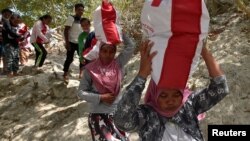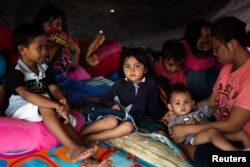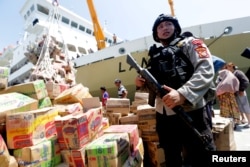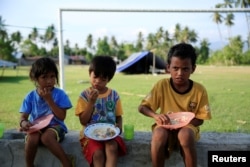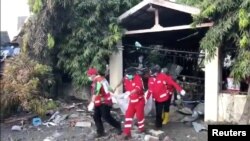The full scale of a double disaster in Indonesia is beginning to emerge as rescue teams arrive and reach more remote areas, five days after a 7.5 magnitude earthquake and tsunami devastated coastal areas of the Central Sulawesi province.
Ongoing shortages of food, water, fuel and medical supplies are causing many locals to leave the affected areas, while aid agencies are expressing concern about the people left behind, including thousands of children. There also have been reports of looting in recent days.
Indonesia's disaster management agency said Tuesday the death toll had risen to 1,234. There are an estimated 50,000 internally displaced people, and the government has said some 1.5 million are potentially affected by the disaster.
Stanley Widianto, a journalist who is reporting from Palu, told the Voice of America there were two groups of the internally displaced: those going to official humanitarian assistance centers and then "those who don't want to be separated from their families so they stay in a clan, in the village. The second group is the one that's not getting a lot of aid."
"They're desperate," said Marc Vegara, UNICEF's communications chief in Indonesia. "The aid is filtering through but it's not enough for the 60,000 or so people displaced, and displaced people too afraid to get back to their home because they're afraid it may collapse."
Thousands of survivors are sleeping in the open as aftershocks of the devastating quake have continued in subsequent days. Iris Van Deinse, a spokesperson for the International Federation of the Red Cross and Red Crescent Societies who is on the ground in Palu, told VOA that while access to more remote areas like Donggala and Sigi had improved, trees were still blocking roads leading toward some affected areas.
International assistance
President Donald Trump told a Rose Garden press conference Monday the U.S. has "already sent a lot of first responders, and military, and others to help. But it's a really bad, bad situation."
The State Department said in a statement the U.S. had released $100,000 in initial aid through the United States Agency for International Development for disaster assistance (USAID). It said it is working closely with the USAID and U.S. Defense Department to determine how else it can best help.
USAID said in a statement Monday it had a team of disaster experts on the ground "who are conducting assessments of damage, identifying priority needs, and coordinating closely with local authorities, the Government of Indonesia, humanitarian partners, and faith-based organizations on response efforts."
"It's an area that was already not doing so well when it came to basic services, basic indicators, we're talking about nutrition, water, sanitation education, poverty," said Vergara of UNICEF. "So, this disaster is hitting a population, especially children, that were already vulnerable."
Fears for survivors
Many people that have the resources want to leave. Local media reported Tuesday about 5,800 survivors were flown out of the disaster zone by military Hercules planes to Makassar, the largest city in Sulawesi.
Vergara said given the number of dead, it is likely there will be many children who will have lost their parents, posing grave child-protection risks. Roughly one-third of children in Sulawesi do not have birth certificates.
"A birth certificate is really a passport for protection in the sense that it will link a child to a family," he explained. "If there is no document and the child is too young to say who their parents are or where they live, anyone can grab a child, which obviously opens the door to exploitation, trafficking and so on."
More than 100 Indonesian Red Cross workers are undertaking search and rescue in the areas of Palu, Donggala and Sigi.
"We also distribute water, and we are also involved in basic healthcare right now," Van Deinse said. "Today while we were driving to Sigi, a few people came to the car because they had fractures and open wounds, so we helped them."
Local medical centers and hospitals were damaged by the earthquake and the Indonesian military has erected a field hospital in Palu. Widianto visited the largest hospital in the city, where facilities were "not great" and electricity was not running, so "a lot of the doctors rely on a generator to perform surgery, and even that was not enough."
"Before help came in from Jakarta or Bandung they were only staffed by like 10 people," said the journalist. "Even now they're understaffed mostly."




